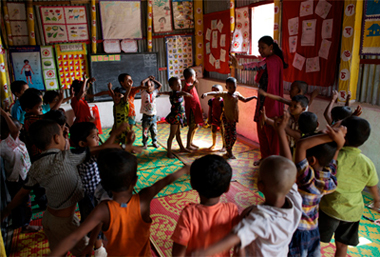“The one thing all children have in common is their rights. Every child has the right to survive and thrive, to be educated, to be free from violence and abuse, to participate and to be heard. “
Secretary-General Ban Ki-moon

http://www.un.org/en/events/childrenday/
Spotlight on the Global Child Health Program, McGill University Department of Pediatrics
Information provided by Dr. Jennifer Turnbull and Dr. Gillian Morantz, Co-directors of the Global Child Health Program
As 2015 comes to a close, we can reflect back on the past decades and see the incredible gains that have been made toward child health and welfare. Global under-5 mortality has been more than halved since 1990, and the number of children of primary school age who are out of school has also been cut in half since 2000. Over 6 million malaria deaths were averted in the last 15 years, mostly in children under-5 in sub-Saharan Africa, and measles vaccination prevented almost 15.6 million deaths between 2000 and 2013.
But despite these successes, 6 million children under-5 will have died in 2015. The poorest and most vulnerable children still suffer from poor health outcomes that are not reflected in global averages. Our most precious resource, our children, still require our ongoing advocacy and commitment to improve health, gender equality, education, and protection. Our actions must occur both locally and globally, everywhere that inequality exists.
The Global Child Health Program (GCHP) in the Department of Pediatrics at McGill aims to contribute sustainably to the health and well-being of children in both resource-limited settings and those served by the Montreal Children’s Hospital, by establishing mutually beneficial partnerships with pediatric centres in resource-limited settings, and by engaging in global health advocacy, medical education, research, capacity building, and knowledge translation.
The GCHP has a partnership with the Centre Hospitalier Universitaire de Kigali in Rwanda. Programs currently under development include a Pediatric Nephrology and Dialysis program, telemedicine, research training and mentorship through MicroResearch, neonatology training, and nursing education.
Both basic and advanced Pediatric Global Health training is provided by the GCHP as part of its educational mandate. All Pediatric residents at McGill are taught a core curriculum developed by the Canadian Pediatric Society, which prepares future pediatricians for their work with diverse and global populations in Canada. The Advanced Curriculum in Pediatric Global Health is a competency-based multidisciplinary course that runs monthly over 2 years. It is open to family medicine and pediatric residents, nurses, and allied health professionals who have an interest in working directly with children new to Canada, or children living in resource-limited settings. Pediatric residents from Hôpital Sainte Justine also participate. The course is required as pre-departure training for Pediatric residents at McGill prior to electives in resource-limited settings outside of Canada. The next course starts in September 2016 and the deadline to register is August 31st of each year.
For more information or to be placed on our email list for updates, please contact us at: gchp@mcgill.ca.
SOCIAL MEDIA https://www.facebook.com/GlobalChildHealthProgram/
